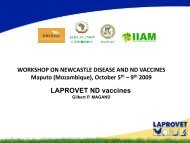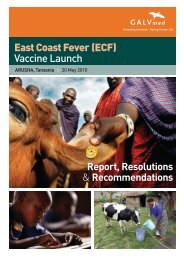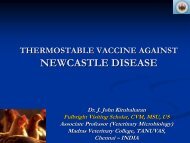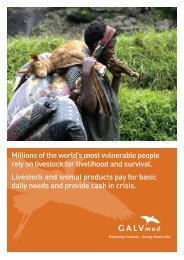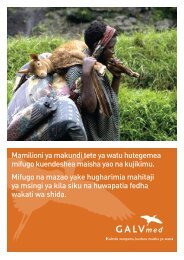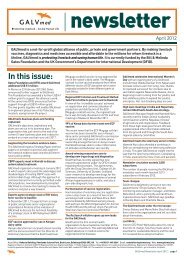A Path to Prosperity New Directions for African Livestock
GALVmed Impetus Strategy Paper
GALVmed Impetus Strategy Paper
- No tags were found...
You also want an ePaper? Increase the reach of your titles
YUMPU automatically turns print PDFs into web optimized ePapers that Google loves.
As of August 2010, 22 countries had signed CAADP<br />
Compacts. The compacts, signed by all key partners,<br />
agree how the country will do the following:<br />
> align state policies with regional priorities<br />
and CAADPs four Pillars;<br />
> exploit synergies, discuss economic bottlenecks<br />
between neighbouring countries and decide<br />
appropriate action on those matters;<br />
> identify gaps in donor funding needed <strong>to</strong> achieve<br />
agreed priorities;<br />
> initiate work <strong>to</strong> moni<strong>to</strong>r and evaluate CAADP's<br />
progress at the national, regional and<br />
continental levels;<br />
> make long-term commitments <strong>to</strong> finance<br />
agricultural investment programmes that are<br />
aligned with CAADP principles and targets.<br />
The country roundtable process is flexible and is<br />
being constantly adapted. Success will be measured<br />
by the extent <strong>to</strong> which policies and investment<br />
programmes change, but there is, <strong>to</strong> date, little<br />
evidence of impact. A recent review of the CAADP<br />
roundtable process suggests the need <strong>for</strong><br />
significant improvements in the procedures in order<br />
<strong>to</strong> ensure national governments really own the<br />
Compact commitments. There appears <strong>to</strong> be a<br />
concern that the roundtable process can become<br />
mere window dressing <strong>for</strong> increased donor support 135 .<br />
The review suggests more detailed follow up of each<br />
compact is required in terms of expenditure reviews,<br />
institutional capacity building and strengthening<br />
capacity <strong>for</strong> evidence-based policy making.<br />
The RECs have an important role in terms of<br />
guiding countries on how best <strong>to</strong> implement CAADP,<br />
providing funds <strong>to</strong> support the roll-out of CAADP in<br />
regions and countries and moni<strong>to</strong>ring progress<br />
<strong>to</strong>wards CAADP targets in their region. The RECs<br />
are also designing and implementing CAADP<br />
Compacts at regional level, sometimes with the<br />
support of a specialist networking organisation.<br />
For example, the Food, Agriculture and Natural<br />
Resources Policy Analysis Network (FANRPAN)<br />
supports a range of organisations and governments,<br />
including COMESA, <strong>to</strong> build linkages and<br />
partnerships between government and civil society,<br />
improve policy analysis and policy dialogue and<br />
support demand-driven policy research.<br />
Inter-<strong>African</strong> Bureau of Animal<br />
Resources [AU/IBAR]<br />
The AU’s IBAR is the key technical advisory and<br />
coordinating body <strong>for</strong> the lives<strong>to</strong>ck sec<strong>to</strong>r in Africa.<br />
IBAR pre-dates the OAU; <strong>for</strong>med in 1951, it has<br />
played a significant role in the eradication of<br />
rinderpest through the Pan-Africa Rinderpest<br />
Campaign. IBAR’s 2010–2014 strategic plan commits<br />
it <strong>to</strong> aligning its programming with the principles and<br />
strategic focus of CAADP. It also affirms that IBAR is<br />
planning <strong>to</strong> cover all aspects of animal resources<br />
(i.e. the lives<strong>to</strong>ck, fisheries and wildlife, including the<br />
management of the natural resource base on which<br />
they depend). This marks an important shift from<br />
AU-IBAR’s previous bias <strong>to</strong>ward animal health<br />
initiatives. IBAR has strong partnership agreements.<br />
It is actively involved in agenda setting with global<br />
organisations such as WTO, OIE, WHO and FAO.<br />
It supports the RECs who, under AU strategy, are<br />
its principal partners, whilst retaining close links<br />
with AU member states, particularly veterinary<br />
departments. IBAR also manages the “ALive<br />
Partnership,” a networking and policy initiative that<br />
brings most stakeholders, including civil society<br />
and donors, <strong>to</strong>gether <strong>to</strong> discuss a range of issues<br />
affecting the sec<strong>to</strong>r 12 .<br />
Over the next four years IBAR is focusing on the<br />
following strategic areas:<br />
1 Reducing the impact of trans-boundary animal<br />
diseases (TADs) and zoonoses on human<br />
livelihoods and public health in Africa.<br />
2 Enhancing Africa’s capacity <strong>to</strong> characterize,<br />
conserve and sustainably use its animal<br />
resources and their resource base.<br />
3 Improving investment opportunities in, and<br />
competitiveness of, animal resources in Africa.<br />
4 Promoting development of standards and<br />
regulations and facilitation of compliance.<br />
5 Improving knowledge management in animal<br />
resources <strong>for</strong> in<strong>for</strong>med and timely decision making.<br />
6 Facilitating development of policies and institutional<br />
capacities <strong>for</strong> improved utilization of animal<br />
resources in Africa.<br />
IBAR has €50 million <strong>to</strong> spend on existing projects <strong>to</strong><br />
support the above areas and new programme funding<br />
in the pipeline. In 2011 AU/IBAR will guide the<br />
implementation of a programme <strong>for</strong> “rein<strong>for</strong>cing<br />
veterinary governance in Africa,” funded by the EC.<br />
12 ALive has produced a number of policy documents. A survey conducted by ALive in 2007, showed few countries included lives<strong>to</strong>ck as a specific<br />
issue in their Poverty Reduction Strategy Papers. Out of 34 Sub-Saharan countries, only four had a specific PRSP on lives<strong>to</strong>ck while ten had no<br />
mention at all of the sec<strong>to</strong>r and the remaining countries only dedicated a few paragraphs <strong>to</strong> the sec<strong>to</strong>r in their PRSP.<br />
The Impetus Strategy Paper I Page 54




